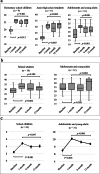A pilot study of game-based learning programs for childhood cancer survivors
- PMID: 35351044
- PMCID: PMC8962149
- DOI: 10.1186/s12885-022-09359-w
A pilot study of game-based learning programs for childhood cancer survivors
Abstract
Background: Childhood cancer survivors lacking awareness on their potential risks of late effects often fail to seek adequate follow-up care. Patient education matching their preference is of great importance to improve their adherence to survivorship care. In this study, we developed two age-dependent game-based learning programs, which enable continuous approaches for childhood cancer survivors along their intellectual maturation. Then, we assessed the effectiveness of the programs.
Methods: Childhood cancer survivors over 10 years of age who regularly visited a long-term follow-up clinic were enrolled in this study. They were requested to play either of two different types of game tools, one for school children and another for adolescents and young adults, for one month at home. To evaluate the educational effects of the programs, they were examined for health management awareness, self-esteem, and knowledge on cancer-related late effects before and after the intervention with age-based questionnaires and knowledge tests.
Results: Among 83 participants, 49 (59.0%) completed the assessments over the period of 12 months. The health management awareness and knowledge levels increased significantly at 1-month after the intervention as compared to the baseline in both school children and adolescents/young adults (for health management awareness, p = 0.011 in elementary school children; p = 0.007 in junior high school children; p < 0.001 in adolescents/young adults; for knowledge levels, p < 0.001 in school children; p < 0.001 in adolescents/young adults). The effect was maintained for 12 months in school children while it decreased in adolescents and young adults with time. Self-esteem significantly increased at 1-month (p = 0.002 in school children; p = 0.020 in adolescents/young adults) and was maintained for 12 months in both age groups.
Conclusion: The game-based learning programs enhanced health locus of control and self-esteem in childhood cancer survivors. The game-based learning programs could be applied effectively to survivorship care as a new modality of patient education.
Trial registration: This study was retrospectively registered in UMIN-CTR ( UMIN000043603 ) on March 12, 2021.
Keywords: Childhood cancer survivors; Computer game; Health locus of control; Patient education.
© 2022. The Author(s).
Conflict of interest statement
The authors declare that they have no competing interests.
Figures


References
-
- Oeffinger KC, Mertens AC, Sklar CA, Kawashima T, Hudson MM, Meadows AT, Friedman DL, Marina N, Hobbie W, Kadan-Lottick NS, Schwartz CL, Leisenring W, Robison LL, Childhood Cancer Survivor Study. Chronic health conditions in adult survivors of childhood cancer. N Engl J Med. 2006;355:1572–82. Childhood Cancer Survivor Study. - PubMed
-
- Ozono S, Ishida Y, Honda M, Okamura J, Asami K, Maeda N, Sakamoto N, Inada H, Iwai T, Kamibeppu K, Kakee N, Horibe K. General health status and late effects among adolescent and young adult survivors of childhood cancer in Japan. Jpn J Clin Oncol. 2014;44:932–940. doi: 10.1093/jjco/hyu102. - DOI - PubMed
-
- Wells EM, Ullrich NJ, Seidel K, Leisenring W, Sklar CA, Armstrong GT, Diller L, King A, Krull KR, Neglia JP, Stovall M, Whelan K, Oeffinger KC, Robison LL, Packer RJ. Longitudinal assessment of late-onset neurologic conditions in survivors of childhood central nervous system tumors: a childhood cancer survivor study report. Neuro Oncol. 2018;20:132–142. doi: 10.1093/neuonc/nox148. - DOI - PMC - PubMed
MeSH terms
Grants and funding
LinkOut - more resources
Full Text Sources
Medical

